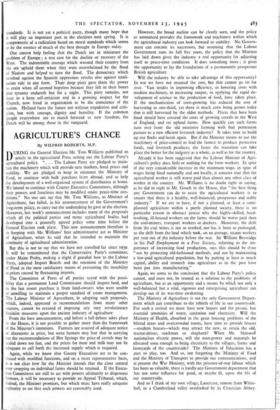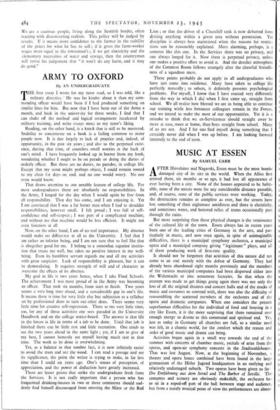AGRICULTURE'S CHANCE
By WILFRID ROBERTS, M.P.
DURING the General Election Mr. Tom Williams published an article in the agricultural Press setting out the Labour Party's agricultural policy. " . . The Labour Party are pledged to main- tain the machinery which will provide sure markets, fixed prices and stability. We are pledged to keep in existence the Ministry of Food, to continue with bulk purchase from abroad, and to help the development of a well-organised system of distribution at home. We intend to continue with County Executive Committees, although their powers and functions may be modified under peace-time con- ditions." No one can .say that Mr. Tom Williams, as Minister of Agriculture, has failed, in his announcement of the Government's long-term policy, to carry out the undertaking he gave at the election. Moreover, last week's announcement includes many of the proposals which all the political parties and many agricultural bodies had developed into a generally agreed policy some time before the General Election took place. This new announcement therefore is in keeping with Mr. Williams' first administrative act as Minister of Agriculture, when he said that he intended to maintain the continuity of agricultural administration.
But this is not to say that we have not travelled far since 1939. It will be remembered that the Conservative Party's committee, under Major Proby, making a slight if graceful bow to the Labour Party, adopted Import Boards and the retention of the Ministry of Food as the-most satisfactory means of preventing the instability in prices caused by fluctuating imports.
The Committee of Peers of all parties toyed with the possi- bility that a permanent Land Commission should inspect land, and in the last resort purchase it from land-owners who were unable or unwilling to maintain a proper standard of estate management. The Labour Minister of Agriculture, in adopting such proposals, which, indeed, appeared in recommendations from many other sources, cannot be accused of imposing any very revolutionary Socialist measures upon the ancient industry of agriculture.
From the bare announcement, and before a full debate takes place in the House, it is not possible to gather more than the framework of the Minister's intentions. Farmers are assured of adequate notice of alterations in price, but some farmers may fear that in carrying out the recommendations of Hot Springs the price of cereals may be scaled down too fast, and the prices for meat and milk may not be adequate to call forth the increased supply which is required.
Again, while we know that County Executives are to be con- tinued with modified functions, and on a more representative basis, it is not clear how far the Minister intends that the close control over cropping on individual farms should be retained. If the Execu- tive Committees are still to act with powers ultimately to dispossess farmers, it will be necessary so provide an Appeal Tribunal, which, indeed, the Minister promises, but which must have really adequate authority to see that such powers are reasonably used. However, the broad outline can be clearly seen, and the policy as announced provides the framework and machinery within which the agricultural industry can look forward to stability. No Govern- ment can commit its successors, but assuming that the Labour Government runs its full five years, the policy that the Minister has laid down gives the industry a real opportunity for adjusting itself to peace-time conditions. It does something more ; it gives the opportunity to lay the foundations of a permanently prosperous British agriculture.
Will the industry be able to take advantage of this opportunity? In war we have not counted the cost, but that cannot go on for ever. 'Vast strides in improving efficiency, in lowering costs with modern machinery, in increasing output, in applying the rapid de- velopment of science to the production of food, have taken place. If the mechanisation of corn-growing has reduced the cost of harvesting to one-third, yet there is much corn being grown today that is still harvested by the older methods. Prices that have been fixed should have covered the costs of growing cereals in the West of England, and on upland farms. How quickly can such farms turn over from the old extensive farming with bad permanent pasture to a new efficient livestock industry? It takes time to build up our flocks and herds again. But if the Minister means to use the machinery of price-control to lead the farmer to produce protective foods, and livestock products, the faster the transition can rake place the better for the industry as a whole, as well as for the country. Already it has been suggested that the Labour Minister of Agri- culture's policy does little or nothing for the farm workers. In spite of the very considerable increase in the minimum wage, in spite of wages being fixed nationally and not locally, it remains true that the agricultural worker is still worse paid than almost any other class of worker in the country. Mr. Williams is no doubt right in saying, as he did in reply to Mr. Gooch in the House, that " the best thing any Government can do to assist the agricultural workers is to ensure that there is a healthy, well-balanced, prosperous and stable industry." If we are to have, if not a planned, at least a semi- planned agriculture within a partly planned society, there is no particular reason in abstract justice why the highly-skilled, hard- working, ill-housed workers on the farms should be worse paid than the coal-miners, transport workers or dockers. Moreover, the drift from the coal mines is not so marked, nor has it been so prolonged, as the drift from the land which took, on an average, to,000 workers per year out of the industry before the war. Sir William Beveridge
in his Full Employment in a Free Society, referring to the im-
portance of increasing food production, says this should be done " not by protecting old-fashioned methods, and not by maintaining a low-paid agricultural population, but by putting at least as much capital, ability and research into agriculture as in the past have been put into manufacturing."
Again, we come to the conclusion that the Labour Party's policy cannot, and must not, be treated as a solution to the problems of agriculture, but as an opportunity and a means by which not only a well-balanced but a vital, vigorous and enterprising agriculture can develop out of its war-time awakening.
The Ministry of Agriculture is not the only Government Depart- ment which can contribute to the rebirth of life in our countryside.
For such a revival we must have new houses and the prosaic but essential amenities of water, sanitation and electricity. Will the Ministry of Health, absorbed in the great housing problems of the blitzed areas- and overcrowded towns, have time to provide houses —modern houses—which may attract the new, or retain the old, tractor-driver, stockman or shepherd? When Mr. Shinwell nationalises electric power, will the man-power and materials be allocated soon enough to bring electricity to the villages, farms and farmyards of the countryside? The Ministry of Education has a part to play, too. And so, not forgetting the Ministry of Food and the Ministry of Transport to provide our communications, and at present the War Ministry, with the prisoner-of-war labour which has been so valuable, there is hardly any Government department that has not some influence for good, or maybe ill, upon the life of our countryside.
And so I think of my own village, Lanercost, remote from White- hall, in a Cumberland valley overlooked by its Cistercian Abbey. We are a cautious people, living along the Scottish border, often reacting with disconcerting realism. This policy will be judged by results. If it means more confidence to the farmer in the stability of the prices for what he has to sell ; if it gives the farm-worker wages more equal to the townsman's ; if we get electricity and the elementary necessities of water and sewage, then the countryman will revise his judgement that " it won't do any harm, and it may do good."



























 Previous page
Previous page